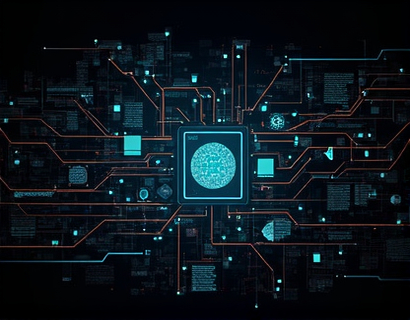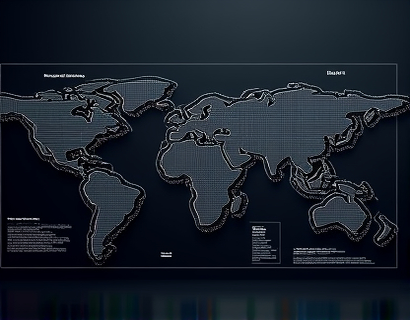Decentralized Corporation Software: Streamlining Registration with Enhanced Security and Efficiency
The landscape of corporate formation and management is undergoing a transformative shift with the advent of decentralized technology. This shift promises to revolutionize the way businesses operate, offering unprecedented levels of transparency, security, and efficiency. Decentralized corporation software is at the forefront of this revolution, providing a robust solution for entrepreneurs and business owners seeking to navigate the complexities of modern corporate law with ease and confidence.
Understanding Decentralized Corporations
Before delving into the specifics of decentralized corporation software, it's essential to grasp the concept of decentralized corporations. Unlike traditional corporations, which are governed by centralized authorities and hierarchical structures, decentralized corporations leverage blockchain technology to create a more democratic and transparent governance model. This model eliminates the need for intermediaries, reduces bureaucratic overhead, and ensures that all stakeholders have a say in the decision-making process.
Decentralized corporations, often referred to as decentralized autonomous organizations (DAOs), operate on a blockchain network. This means that all transactions, decisions, and records are immutable and transparent, accessible to all members of the organization. The use of smart contracts further automates and enforces the rules and regulations, ensuring compliance and reducing the risk of fraud or human error.
Streamlining Registration with Decentralized Software
One of the most significant advantages of decentralized corporation software is its ability to streamline the registration process. Traditional corporate registration is often a cumbersome and time-consuming task, involving numerous steps and interactions with various governmental and legal entities. Decentralized software simplifies this process by automating many of these steps, making it more efficient and accessible.
The registration process begins with the creation of a digital charter, which outlines the core principles and operational rules of the corporation. This charter is stored on a blockchain, ensuring its integrity and transparency. The software then guides the founder through the necessary legal and regulatory requirements, providing checklists and templates to ensure compliance. This not only saves time but also reduces the risk of errors that could lead to legal issues down the line.
Key Features of Decentralized Registration Software
- Automated Compliance Checks: The software automatically verifies that all required documents and information meet legal standards, reducing the need for manual reviews and audits.
- Smart Contract Integration: Smart contracts are used to enforce the terms of the charter, ensuring that all stakeholders adhere to the agreed-upon rules and procedures.
- Real-Time Updates: Any changes to the charter or organizational structure are immediately reflected and recorded on the blockchain, providing real-time transparency.
- Access Control: The software manages access to sensitive information and decision-making processes, ensuring that only authorized members can make changes or view critical data.
Enhancing Security through Decentralized Solutions
Security is a paramount concern for any business, and decentralized corporation software offers robust solutions to protect sensitive data and ensure the integrity of the organization. The decentralized nature of the software means that data is not stored in a single, vulnerable location but is instead distributed across a network of nodes. This distribution makes it extremely difficult for malicious actors to compromise the system.
Additionally, the use of advanced cryptographic techniques ensures that all data is encrypted both in transit and at rest. This encryption makes it nearly impossible for unauthorized parties to access or alter the information. The immutability of blockchain technology further enhances security, as any attempt to tamper with the data would be immediately detectable and rejected by the network.
Decentralized Identity Management
Another critical aspect of security in decentralized corporations is identity management. Decentralized identity solutions allow members to control their personal data and decide who can access it. This not only enhances privacy but also reduces the risk of identity theft and fraud. The software can integrate with decentralized identity providers to ensure that only verified and authenticated members can participate in the organization's activities.
Improving Efficiency with Decentralized Processes
Efficiency is a key benefit of decentralized corporation software, as it automates many of the manual and repetitive tasks associated with traditional corporate management. By leveraging blockchain and smart contracts, the software can streamline operations, reduce administrative burdens, and accelerate decision-making processes.
For instance, financial transactions within the corporation can be executed directly and instantly through smart contracts, eliminating the need for intermediaries such as banks or legal firms. This not only speeds up the process but also reduces transaction costs. Similarly, voting and governance processes can be conducted in a transparent and tamper-proof manner, ensuring that all decisions are made fairly and efficiently.
Real-World Applications
The potential applications of decentralized corporation software are vast and varied. Startups can use it to quickly and easily set up a legally compliant structure, allowing them to focus on innovation and growth. Established companies can leverage the software to restructure their governance models, making them more agile and responsive to market changes. Non-profits and community organizations can benefit from the increased transparency and accountability, fostering greater trust and support from their stakeholders.
Moreover, the global nature of blockchain technology means that decentralized corporations can operate across borders with ease, adhering to international standards and regulations without the need for complex and costly local adaptations.
Challenges and Considerations
While the benefits of decentralized corporation software are clear, there are also challenges and considerations that businesses should be aware of. One of the primary challenges is the regulatory landscape, as the legal recognition and treatment of decentralized corporations vary significantly across different jurisdictions. Businesses must stay informed about local and international regulations and ensure that their decentralized structures comply with all relevant laws.
Another consideration is the technical expertise required to implement and manage decentralized software. While the user interfaces are designed to be user-friendly, a basic understanding of blockchain and smart contracts can be beneficial. Companies may need to invest in training or hire specialists to fully leverage the capabilities of the software.
Future Trends
The future of decentralized corporation software is promising, with ongoing developments in blockchain technology and increasing adoption by businesses of all sizes. As more companies recognize the advantages of decentralized models, we can expect to see further innovations in areas such as interoperability, scalability, and user experience. The integration of artificial intelligence and machine learning could also enhance the functionality of these platforms, providing more intelligent and automated solutions for corporate management.
Additionally, the rise of decentralized finance (DeFi) and other blockchain-based services will likely lead to more comprehensive ecosystems where corporations can not only form and manage themselves but also access a wide range of financial and operational tools.
Conclusion
Decentralized corporation software represents a significant leap forward in the way businesses are formed and managed. By streamlining registration, enhancing security, and improving efficiency, this technology offers a transparent and accessible path to corporate success. As the world continues to embrace decentralized solutions, entrepreneurs and business owners have the opportunity to harness these tools to build more resilient, democratic, and innovative organizations. Embracing decentralized corporation software is not just a choice; it's a step towards a more transparent and efficient corporate future.









































